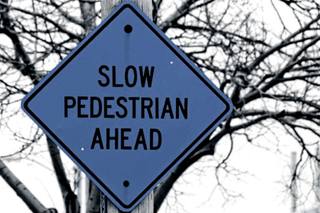
Why You Hate Walking Behind Slow People
Your ‘sidewalk rage’ is a result of thwarted expectations in an instantly gratified world.

It is a truth universally acknowledged that there is nothing worse than a person who walks slowly when you’re in a hurry. There’s even a name for the emotion the experience evokes — sidewalk rage. The resentment builds even though we may rationally know the person isn’t walking that slow — we’re just in a hurry. So why do we hate walking behind slow people so much?
First, healthy brains are notoriously poor markers of time — for a variety of neurological reasons, they tend to perceive time as passing slightly slower than it really does, identifying a 90-second interval at 95 or 100 seconds, according to a report by Cody C. Delistraty for The Atlantic. And under stress — which, to a relative degree, occurs when you’re walking behind someone who just won’t move faster — healthy brains have the potential to experience time even more slowly.
Walking or driving behind slow people also thwarts our expectations of how long a journey should take. Whether or not we realize it, our brain is constantly making predictions, which informs expectations, about the timing of events.
“A lot is dependent on expectation — if we expect something to take time then we can accept it. Frustration is often a consequence of expectations being violated,” James Moore, a neuroscientist at Goldsmiths, University of London, told Chelsea Wald, reporting for Nautilus.
This is especially true for urban environments; in a 1989 survey of 10 places around the U.K. and Australia, researchers D. Jim Walmsley and Gareth Lewis found the bigger the city, the faster people walk. They theorized the reason boiled down to the old adage: Time is money. “Economizing on time becomes more urgent and life becomes more hurried and harried” in a bigger city, they suggested. This means a dawdler is an exception — a challenge to our expectations — rather than the norm in urban environments.
Related on The Swaddle:
Chasing Happiness Can Skew Your Perception of Time
Fast-forward 30 years, and that urban speed-walking has been compounded by a culture of instant gratification — food is fast, messaging is instant, information is immediate. Which makes delays, like that caused by a slow walker, a novel experience — and novelty affects our perception of time.
Newness tricks our brains into thinking more time has passed than it really has. It’s a phenomenon known as the oddball effect, established by Dartmouth University psychological scientist Peter Ulric Tse and colleagues in 2014. So the novel experience of something — a journey — taking longer than expected could make susceptible to the oddball effect, which makes the journey seem even longer.
The problem is, the seething inner fury that results from a slowed perception of time, when walking or driving behind a slow person, also serves to slow time further. Researchers have found anger, along with emotions like fear, joy, and sadness, has a ‘time-drag’ effect on people.
As our perception of time drags further because of all of these factors, our expectations seem farther and farther away, and our rage mounts — in a vicious cycle.
But it’s one thing to feel anger and another to act on it. Some people walk slowly because they can’t walk faster; some people just don’t feel the time crunch you do. To find out how much of a jerk “sidewalk rage” makes you, a researcher at the University of Hawaii developed a Pedestrian Aggressiveness Syndrome Scale. Take it at your own peril.
Liesl Goecker is The Swaddle's managing editor.
Related


Fossil Fuel Use Causing More Methane Pollution Than We Thought, Scientists Warn
